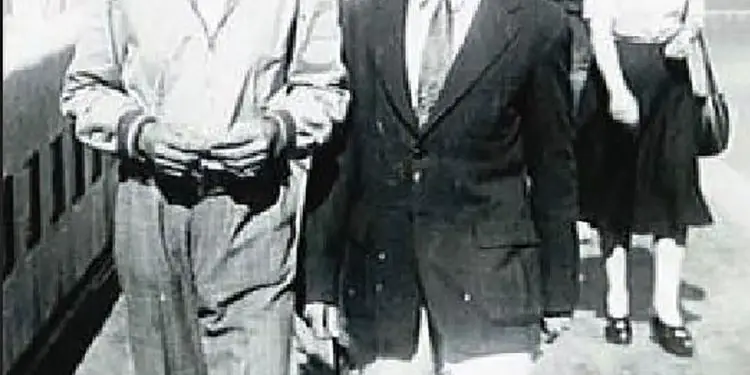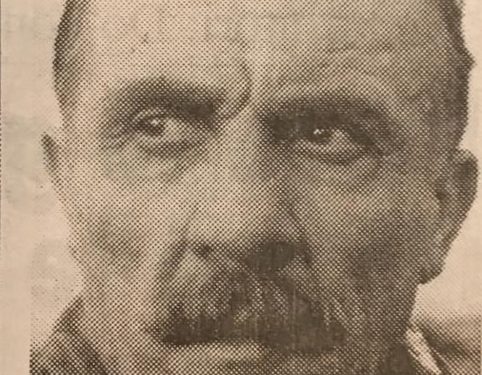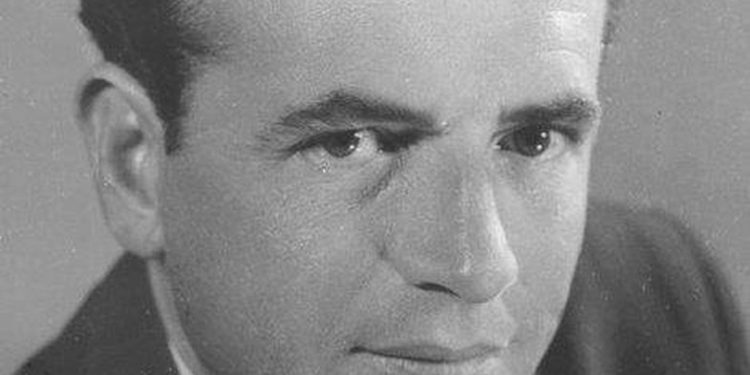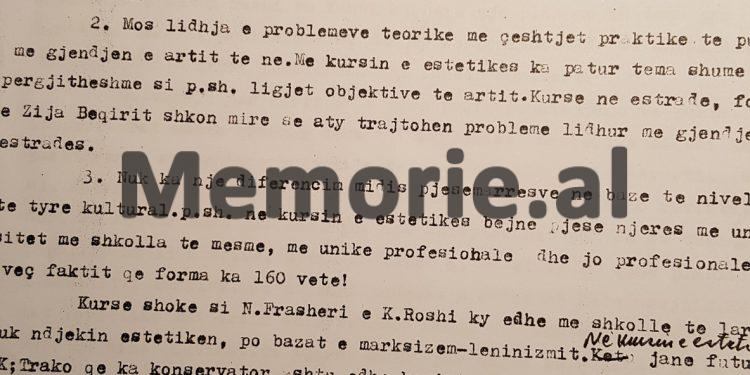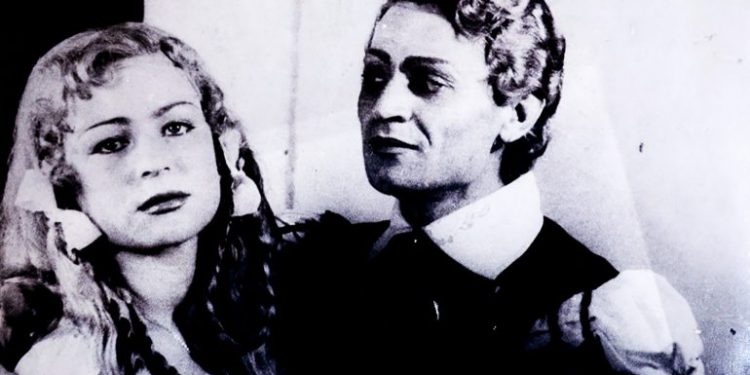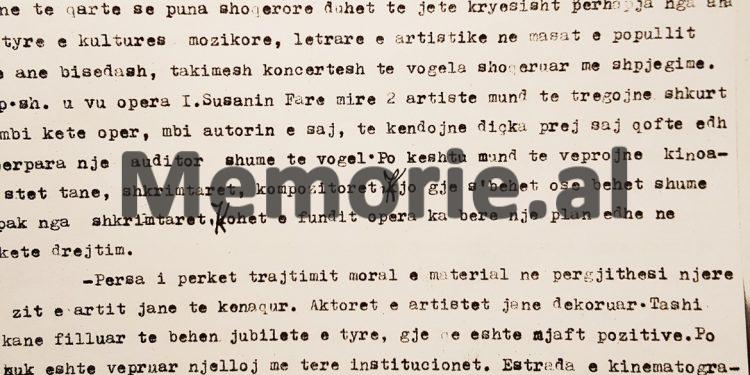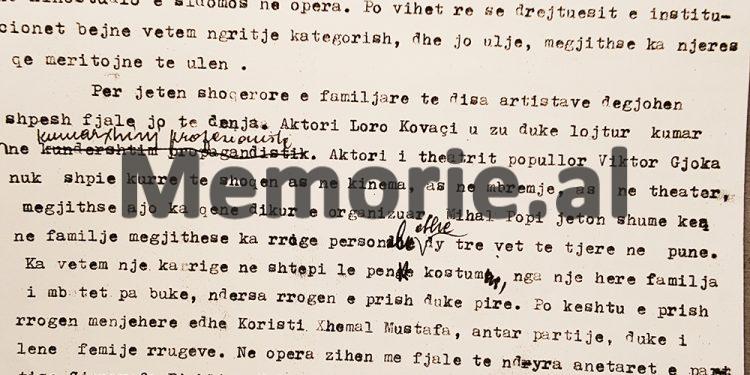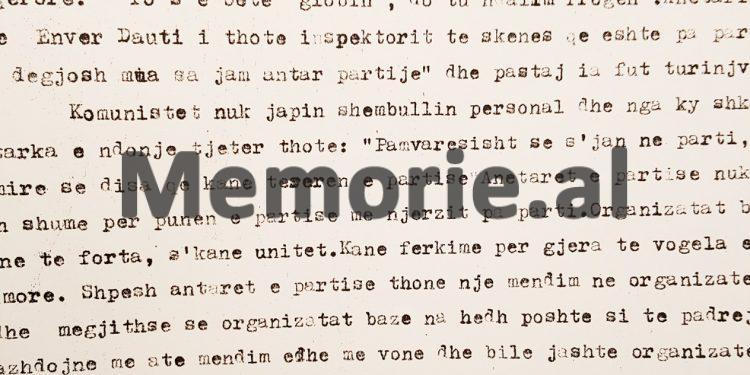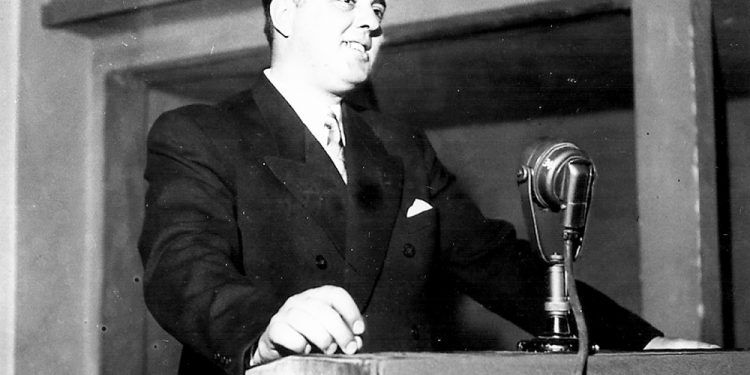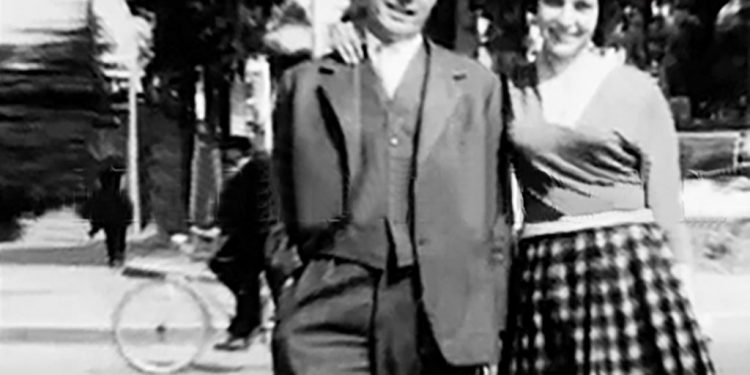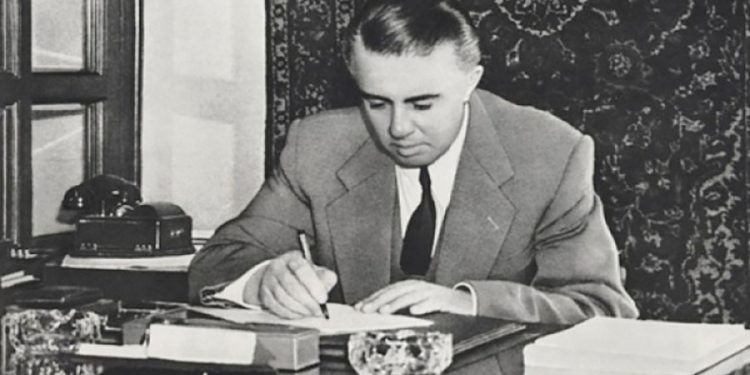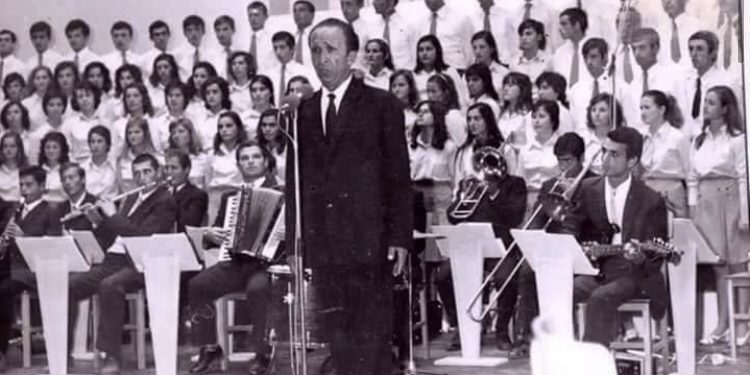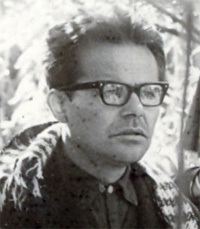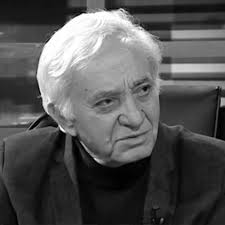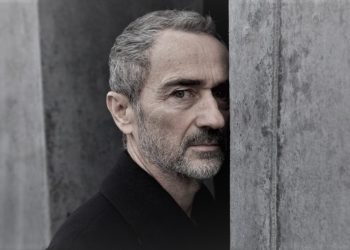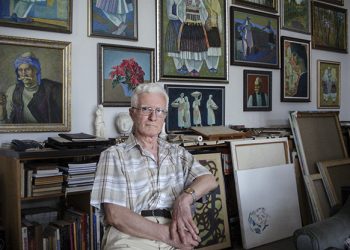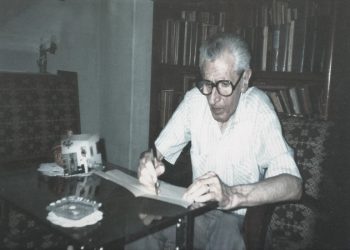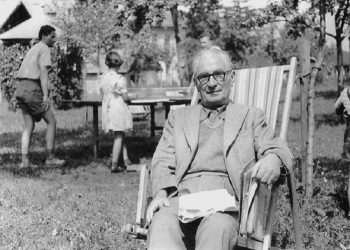Dashnor Kaloçi
Second part
Memorie.al publishes an archival document issued by the Central State Archive in Tirana (fund of the former Central Committee of the ALP), which belongs to 1957, where there is an information report drafted by a working group of instructors of the apparatus of the Central Committee of the ALP (covering propaganda, art and culture), who have participated in the meetings of the basic organization of the Party and that of the Professional Unions of the League of Writers and Artists of Albania, as well as in cultural institutions of the main artistic institutions of Tirana, such as: People’s Theater, State Variety, Opera and Ballet Theater, State Ensemble of Folk Songs and Dances, Kinostudio “Shqipëria e Re”, etc. The full report-information which was sent to Enver Hoxha, where in addition to the work in the professional aspect of the main cultural and artistic institutions of Tirana, as well as the troubles and problems that bothered them, the instructors of the Central Committee of the ALP, have given in detail many of the conversations made by the most prominent writers and artists of that time, which contradicted the socialist realism and the political line that was being followed at that time by the senior leadership of the ALP, such as: Naim Frashëri, Kol Jakova , Kadri Rroshi, Mihallaq Luarasi, Odhise Paskali, Mihal Stefa, Simon Rrota, Mentor Xhemali, Kostandin Trako, Luiza Papa, Ramadan Sokoli, Tinka Kurti, Margarita Kristidhi, Hamide Stringa, Esma Agolli, Kristaq Dhamo, Sulejman Pitarka, Qihaan Toro, Viktor Gjoka, Enver Dauti, Lluk Kaçaj, Rrok Dabërdaku, Hasan Reçi, Injac Dema, Irena Gjergo, Gaqo Zdruli, Zija Beqiri, Gjenovefa Bimbli, Andromaqi Hadëri, Behije Çela, Milena Asllani, Jorgji Bitra, Violeta ri, etc.
The liberal policy pursued by Nikita Khrushchev and his supporters in the Kremlin and the Soviet Union after Stalin’s death in the second half of the 1950s, in a way resonated to some extent in Enver Hoxha’s communist Albania, which gave its effects also in the Tirana Conference in 1956, where many communists and cadres even from the high ranks of power of that time, raised and harshly criticized some of the privileges of the main leadership of the ALP and the great gap that they had created with the common people, both by way of life and by economic condition.
In this context of the events of that time (both in the Soviet Union and in other communist countries of Eastern Europe), the condemnation of the cult of Stalin, the opening to the West, the spirit of liberalism they were pursuing and the change of political course , there was a great sensitivity in the Albanian society and mainly in the writers and artists, who by the very nature of their work (visits and contacts with the outside world), were closer to the spirit that Khrushchev’s policy was trying to convey to the countries its other satellites.
Among other things, this is made known by this archival document belonging to 1957, which is detached from a voluminous file and addressed directly to Enver Hoxha, where a working group of instructors of the Central Committee of the ALP- covering propaganda, art and culture, have participated in the meetings of the basic organization of the Party and that of the Professional Unions of the League of Writers and Artists of Albania, as well as cultural and artistic institutions of Tirana, such as: People’s Theater, Opera Theater and Ballet, the State Ensemble of Folk Songs and Dances, Kinostudio “New Albania”, State Estrada, etc., have compiled the report-information in question for their superiors.
The document in question, which is entitled “On the ideo-political education of writers and artists in Tirana”, at first glance seems to be related only to the forms of education of writers and artists, or the problems and problems they had in it indeed all the employees of the cultural and artistic institutions of Tirana, but there are clear denunciations for a large number of writers and artists, not only from Tirana, but also from Shkodra, etc.
For example, for: Kol Jakova, Kadri Rroshi, Odhise Paskali, Mihal Stefa, Simon Rrota, Mentor Xhemali, Luiza Papa, Ramadan Sokoli, Margarita Kristidhi, Hamide Stringa, Viktor Gjoka, Lluk Kaçaj, Rrok Dabërdaku, Irena Gjergon Gaqo Zdrulin, Mihal Stefa, Gjenovefa Bimblin, Behije Çela, Milena Asllani, Jorgji Bitrin, Violeta Frashëri etc.
We emphasized that these writers and artists are pure denunciations and espionage, because in addition to the problems of their professional work, in the report-information in question, there is a lot of information about their private and family life, even about very intimate things. But the main thing is that information was gathered against them about the way of life, as well as about what they were talking about, which was contrary to the spirit and political line that was being followed at that time by the communist leadership of official Tirana.
And the very fact that all of them were sent to Enver Hoxha, speaks clearly about the great sensitivity that the communist regime had towards writers and artists as well as the dictatorship that was exercised over them. Like most of the documents published in this book, this document is published in full and without any changes.
Continued from the previous issue
Report-information of the group of instructors of the apparatus of the Central Committee of the ALP, sent to Enver Hoxha
I N F O R M A C I O N
ON THE IDEO-POLITICAL EDUCATION OF WRITERS AND ARTISTS OF TIRANA
There are many shortcomings in the course of Marxist-Leninist aesthetics: The reasons for the poor form of the forms are different.
The low interest of the basic organization of the party for ideo-political education, the low interest of the mass of listeners themselves for raising the ideo-political level, because they did not understand the value of this work. Interesting fact: at the last aesthetics seminar came, for the first time since the beginning of this course almost all those who were registered. This is explained only by the fact that the grassroots organization knowing that this issue would be taken into consideration by the District Party Committee, were set in motion and activated.
Do not connect theoretical problems with practical issues of work, with the state of art in us. With the aesthetics course there were very general topics, such as objective laws of art. Whereas in Estrada, Zija Beqiri’s form goes well because it deals with problems related to Estrada’s condition.
There is no differentiation between participants based on their cultural level, for example, the course of aesthetics includes people with university, high school, with unique professional and non-professional. Besides the fact that the form has 160 people! And friends like Naim Frashëri and Kadri Roshi, even with high school, do not follow aesthetics, but the basics of Marxism-Leninism.
Both Kostandin Trako, who has a conservative, and choirs such as Violeta Frashëri, who is unique, have been included in the aesthetics course, and Kostandin Trako says: I say a wrong word and then the users see me differently.
This word of his is not so right, but it must be borne in mind that this has to do with the meaning of the intellectual as well as with the environment in which he works. There is also a difference in the political school; with secondary, with incomplete primary.
Women usually participate less in forms of education and this has its reasons. One of the Variety forms took place at 12.30pm at the time the women go home to arrange the children for lunch. At the same time, Opera was making the format. Now, as in the Theater, as in the Opera, the forms will be made in the morning, before the start of work. In Opera it was done and there were results.
The actor’s master class is held at the People’s Theater, but his work has nothing to do with the issues of our stage, and the practice of logical analysis was done with unhealthy materials. With the Ensemble of Folk Songs and Dances, a systematic work is done for professional education; there are developed topics on our popular folklore on music.
There are four instrumentalist courses at the Opera, but only 20 people take part. The choristers were taken under the patronage of the soloists, but this form was not continued, and in Kinostudio nothing is done. Kinostudio has only recently made a plan with 18 themes for professional development. A series of lectures on musical form will take place with the composers during 1958.
Materials for their professional development are scarce. The text of harmony was written for the composers. The Friendship Association “Albania-Soviet Union” has translated and distributed various materials on Soviet art (such as the materials of the congress of Soviet composers). The magazine “November” has published from time to time, but it is little used. If the People’s Theater has 13 subscriptions, the Opera has only 4, as this was the planning of the Party Committee. There is a great lack in this regard. Soviet art magazines are used very little and only by those who know little Russian. Very few others know what is going on in the world in the field of art.
Therefore, in addition to the task of learning Russian and in addition to the translations made by the artistic institutions themselves, it is imperative that the Albania-Soviet Union Friendship Association help more in this regard (it used to do this better) by occasionally issuing newsletters with material on art from the magazine “Inostranaja leteratyra”, “Teatar”, “Muzika” etc. The publication of the literary-artistic newspaper would help a lot in the development of criticism, in ideo-professional education.
Ideo-professional education will not be done only in meetings. The State Publishing Company has to publish the best Soviet dramas (only one drama has been published so far), and about 60 parts have been translated. There are very good books, such as: “Russian writers on literary work”, “Ezhegognik Mhata”, etc., from which different parts can be translated in the bulletins of the Friendship Association.
In terms of social work are all opportunities to expand. Literary and artistic evenings are held, actors and artists lead amateur groups, especially in the case of campaigns and festivals. Few artists and writers get in touch with readers and spectators for social work, and people without parties become very active.
In Opera there is a tendency that if they are dealing with social work (eg if you lead the choir of a work center one opera choir and two choirs are damaged professionally) and this is the opinion of the director of the Opera, Save Kavaja.
Often the social work takes on a different character; there are opera choirs that lead 4-5 groups of choirs with money. Of course such a chorist is professionally damaged. People and leaders are still not clear that social work should be mainly their dissemination of musical, literary and artistic culture to the masses of the people through conversations, small concert meetings accompanied by explanations.
Ex: u vu opera “I. Susanin” very well 2 artists can tell briefly about this opera, about its author, to sing something from it even in front of a very small audience. So can our filmmakers, writers, composers, this is not done or very little is done by writers, recently opera has made a plan in this regard as well.
In terms of moral and material treatment in general the people of art are satisfied. Actors and artists are decorated. Now they are starting to make their jubilees, which is quite positive. But not all institutions have been treated the same. Estrada and cinematography had the 5th anniversary of their founding. Preparations were made for the celebration as well as proposals for decoration, but due to the lack of interest of the Ministry and they call themselves as if they were stepmothers.
Yes however they are treated well, there are also cases that claim more and this stems mainly because many artists are very detached from life and do not recognize our economic hardships. The big problem is the issue of housing. About 80 writers and artists are in urgent need of housing.
The director of the first feature film, Kristaq Dhamo, lives in the cabin of a cinema, Mihallaq Çarka, the director for music recording, sheds tears for the work of the residence. There are families with 9 people who live in basements where the canal passes, like Nazmi Maloku with 7 children, some of whom have infiltrates in the cellar like Sul Pitarka, like Qenan Toro in the corridor.
Dissatisfaction often arises in categorization issues. There are many cases when the Ministry of Education does not categorize those artists who are proposed by special commissions of institutions, but others who have not been proposed and who do not deserve it. Categorizations by the Ministry of Education are made with delay outside the rules and laws that have been set.
The operator Pashko Çomo was promoted to the category of assistant, exactly the day he was told to do a job, he did not do it and on the same day when he went to the account he found out that his salary had been increased. There are still categorization anomalies in Kinostudio and especially in Opera. It is being noticed that the leaders of institutions only raise categories, and not lower them; however there are people who deserve to be lowered.
Unworthy words are often heard about the social and family life of some artists. Actor Loro Kovaci was caught gambling. Actor Viktor Gjoka never takes his wife to the cinema, to the evenings, or to the theater, even though it was once organized. Mihal Popi lives very badly in the family even though he has a personal salary and two or three people at work. There is only one chair in the house and sometimes the family is left without bread. Similarly, the salary of Xoral Mustafa, also a member of the party, immediately deteriorates.
Party members fight in the opera; Genovefa Bimbli and Milena Asllani on the one hand, with Jorgji Bitri and Violeta Frashëri on the other and the work manages to sue each other? There have been other such cases of verbal abuse at the People’s Theater where Behije Çela holds the flag, especially at the Opera.
Lluk Kaçaj lives a disjointed life and his actions discredit the figure of the artist. He owes debts; even a worker took 3 thousand ALL and then denied it. Unwanted people come and go in the family, so much so that the neighborhood where he lives demands that Lluk Kaçaj leave. These issues have been raised in the meetings and these artists have been advised but still such things happen.
Even the relations of the Party members with the people without the party are not always in order, although from the institutions all the intellectuals are looked at with one eye and are valued according to their ability to work. Roles are not divided according to the party card, but according to the characters of the actors. Despite all this, words are heard here and there from party friends, such as Kadri Roshi who says “Think first about us with parties and then about those without parties”.
Party member A. Muika tells Rrok Dabërdak and Hasan Reçi who made a globe for May 1st. “If you make the globe, we will cut your salary.” Party member Enver Dauti tells the scene inspector who is without a party, “To hear me say I am a party member.” The communists do not set a personal example, and for this reason, Sul Pitarka and others say: “Although they are not in the party, they are better than some who have the party card.”
Party members do not worry too much about the party working with people without a party. Basic organizations are not strong, they do not have unity. They have frictions on small and unprincipled things. Often party members say an opinion in the grassroots organization, and yet the grassroots organization dismisses us as unfair they continue with that opinion. And this comes in the first place because party members are not clear that they should be like all the other members of our party.
Party members’ artists remember that since they are artists, they are no different from non-party artists. Estrada and opera have sometimes held open collections of Opera and Ballet where they have explored various artistic problems. This is a good experience that the People’s Theater should make with Kinostudio, adding to the problems of the meetings. /Memorie.al




